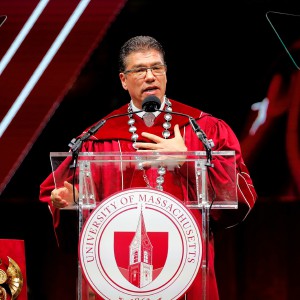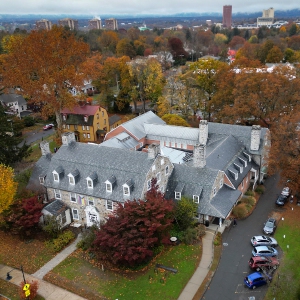New UMass center will “braid” Indigenous know-how, Western science to tackle pressing problems
| Published: 09-14-2023 11:14 AM |
AMHERST — A new center at the University of Massachusetts Amherst aims to harness both Indigenous and Western environmental science to tackle issues relating to climate change, food insecurity and archeological preservation.
The center, officially known as the Center for Braiding Indigenous Knowledges and Science (CBIKS), is one of four newly established science and technology centers to receive funding this year through the National Science Foundation, an independent federal government agency. The center received $30 million in funding from the NSF, to be paid over the next five years, and is the first such NSF-funded center at UMass Amherst.
The new center will be directed by Sonya Atalay, a provost professor of anthropology at UMass Amherst and a member of the Indigenous Ojibwe people of the midwestern U.S. and east-central Canada.
In an interview, Atalay said the center is focused on combining the traditional knowledge systems of Indigenous groups across the world with standard Western methods of scientific research, hence the term “braiding knowledge” for the center.
“Indigenous people globally care for some of the most biodiverse regions in the world,” Atalay said. “We’re trying to understand traditional practices that have been marginalized for a very long time.”
Atalay explained that the Indigenous method of science differs from the Western approach in focusing on relationships between people and the environment, as well as making use of storytelling to convey knowledge, passing down agricultural and sustainable techniques across generations.
“We have scholars that already have built trusted relationships with Indigenous communities, so we aren’t starting from zero in terms of building trust,” Atalay said. “Not only is it adding Indigenous knowledge about the land, but also about the process of getting that knowledge.”
CBIKS’ website list seven different “thematic working groups” that lay out the ethical guidelines and methodologies for synthesizing the two knowledge approaches.
Article continues after...
Yesterday's Most Read Articles
 ‘Home away from home’: North Amherst Library officially dedicated, as anonymous donor of $1.7M revealed
‘Home away from home’: North Amherst Library officially dedicated, as anonymous donor of $1.7M revealed
 Super defers Amherst middle school principal pick to successor; one finalist says decision is retaliation for lawsuit
Super defers Amherst middle school principal pick to successor; one finalist says decision is retaliation for lawsuit
 Granby Bow and Gun Club says stray bullets that hit homes in Belchertown did not come from its range
Granby Bow and Gun Club says stray bullets that hit homes in Belchertown did not come from its range
 Connecticut man gets 8 years in Hadley shooting
Connecticut man gets 8 years in Hadley shooting
 Design Review Board in Amherst backs 5-story apartment project connected to old Hastings building
Design Review Board in Amherst backs 5-story apartment project connected to old Hastings building
 Political newcomer defeats Shores Ness for Deerfield Selectboard seat
Political newcomer defeats Shores Ness for Deerfield Selectboard seat
The center plans on partnering with institutions and Indigenous communities worldwide, including communities in the United States, Canada, New Zealand and Australia. The center has lined up a team of more than 50 scientists, including 30 who have an Indigenous background. Though these groups will be working at eight designated “hubs” across the world, there are plans for all members to meet twice a year in Amherst, Atalay said.
“We’re hoping to share this knowledge with state, federal and tribal agencies,” Atalay said. “Together we’re hoping to protect this Indigenous knowledge.”
Funding for the center was announced by the NSF on Sept. 6, and the center will soon begin planning its first projects. According to Atalay, some of the first projects the center will work on include collaborating with the Indigenous Alaskan community of Nanwalek to study the traditional preservation of salmon populations, studying Native Hawaiians’ agricultural and food waste practices, and documenting environmental signs of climate changes through methods used by Indigenous Australian populations.
Joining the center is Jon Woodruff, a professor of earth, geographic and climate sciences at UMass, who will serve as co-principal investigator. Other principal investigators joining the center hail from other universities across the country: Ora Marek-Martinez, assistant professor of anthropology and associate vice president of Native American Initiatives at Northern Arizona University, and Bonnie Newsom, associate professor of anthropology at the University of Maine.
“Research using a knowledge methodology that includes Indigenous communities increases scientific understanding, can enrich the well-being of Indigenous communities and benefits broader society,” Woodruff said in a statement. “We now need to better understand how to bring together Indigenous and Western sciences effectively and ethically, without replicating the past legacy of problematic scientific practices that often ignored or exploited Indigenous communities and their knowledges.”
Once the five-year funding period is up, the center will be able to apply for additional funding from NSF. With this year’s round of funding, there are now 17 total active science and technology centers supported by NSF across the country. Other centers include a center for quantitative cell biology that partners the University of Illinois Urbana-Champaign and Harvard Medical School, and a center for complex particle systems led by researchers from the University of Michigan.

 Sharing a few notes: High schoolers coaching younger string players one on one
Sharing a few notes: High schoolers coaching younger string players one on one Reyes takes helm of UMass flagship amid pro-Palestinian protests
Reyes takes helm of UMass flagship amid pro-Palestinian protests Sole over-budget bid could doom Jones Library expansion project
Sole over-budget bid could doom Jones Library expansion project Amherst poised to hire police department veteran as new chief
Amherst poised to hire police department veteran as new chief 